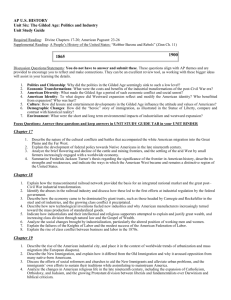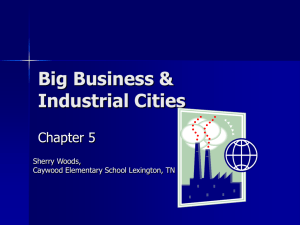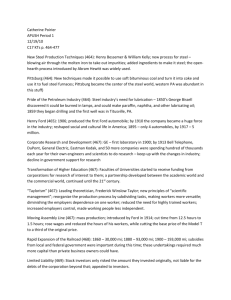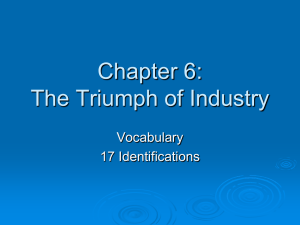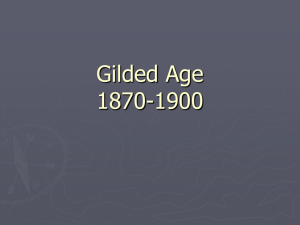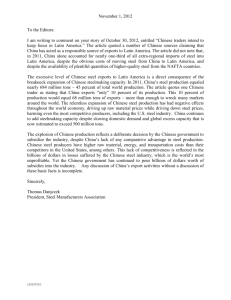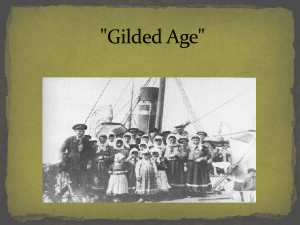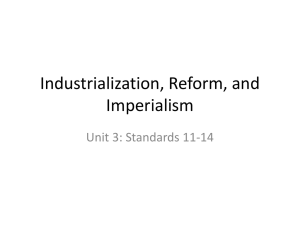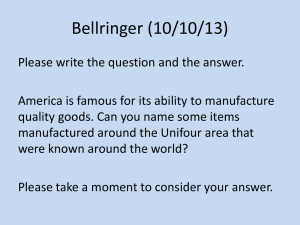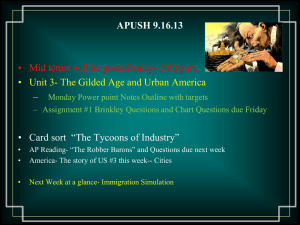Industrialization and Urbanization
advertisement
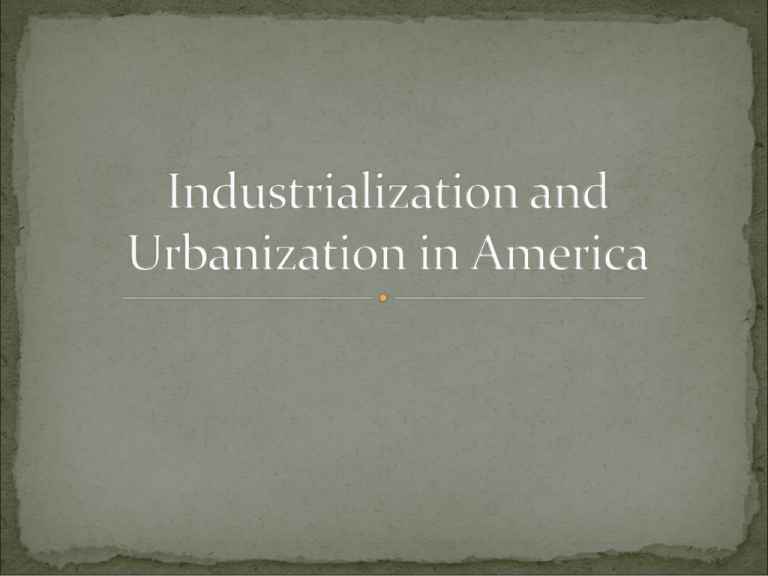
USH.2.1 Identify the factors necessary for industrialization USH.2.1 Describe economic developments that transformed the United States into a major industrial power. USH.2.2 Identify key ideas, movements, and inventions and explain their impact on rural communities and urban communities in the United States USH 2.3-2.7; and many more The process of social and economic change that transforms a human group from a pre-industrial society into an industrial one. Developed country means an industrialized country Developing country means a traditional country; trying to change to an industrialized country Fundamental changes: Daily lives are change: family, work, etc. Politics change “Gilded Age” 4 main changes/factors: Technology Innovation Resources Organization Not every American was happy with the change Every aspect of American culture and politics were changed Moving from rural to urban Farm living to city living Social Darwinism: Herbert Spenser: “survival of the fittest” Do not intervene with poverty William Graham Sumner: Applied Social Darwinism Wrote: “What the Social Classes owe to Each other” (1883) He says they owe nothing to each other Social Darwinism Andrew Carnegie: Came from poor Scottish to America Wrote “Gospel of Wealth” Owned 2/3 of steel (named U.S. Steel) Gave $350 million away Built many libraries for children Horatio Alger: Books on how to change from poverty to rich successful people “From Farm Boy to Senator” “Ragged Dick” Andrew Carnegie U.S. Steel Company Owner Horatio Alger Protestant Work Ethic Hard working is morally good Wealth is morally good Poverty is morally wrong Everything determined by you Elisha Otis Alexander Graham Bell Telephone (1876) Thomas Edison (1847-1931) Safety Elevator (1852) Electricity-light bulb (1880) Granville Woods African American inventor Steam Boiler Furnace (1884) Guglielmo Marconi Wireless telegraph (1896) 1850s: English Henry Bessemer Developed Bessemer Process: Process of purifying iron, resulting in strong, but lightweight steel America quickly adopts the process 1890-U.S. outproducing Great Britain with steel manufacturing. Suspension Bridges created from the creation of steel Brooklyn Bridge (1883 completed) 1st suspension bridge suspended by steel cables Transportation innovations George Westinghouse created air brakes for trains in 1869 Gustavus Swift developed refrigerated cars for carrying food on trains in 1887 1883-three transcontinental railroad lines were created Gilded Age Presidents Rutherford B. Hayes: James Garfield Put down a railroad strike in 1877 by killing 70 workers with the federal army July 2-shot in arm Sept.-died from infection Handed out many jobs Chester Arthur Fair to both political parties Gilded Age Presidents Grover Cleveland Benjamin Harrison Vetoed almost everything that came across his desk Cheated the election Lost popular vote but won electorial vote-2nd to occur Grover Cleveland Only President to run two separate terms Blamed for the 1893 Depression Labor Party was his biggest supporter (Populist) President Benjamin Harrison William Henry Harrison’s son Congress Created Veterans Benefits 1st time vets received benefits Given to only white and black union vets Tariffs: Tax imports Protect American industry Meat packed with much harmful additives inside package Upton Sinclair: The Jungle Spoke on meat packing Conditions of the work Meat was dropped on the floor, sneezed on, coughed on, and still went through Pg 220 Urban places overcrowded Most families live with more than one family in a tenements 1879: windows had to be in every room Trash was thrown out of the window in the street Work 12, 14, or even 16 hrs. a day Apartments (tenements) had no plumbing and no sewage Water shortage Factory work became a very popular way to earn money Sweatshops are factories that are hot, dark, and dirty workhouses with workers working 12 hr shifts. Factory work was very dangerous and locked in No OSHA Workers were killed regularly Workers had very few breaks Knights of Labor founded 1869 by Uriah Stephens Recruited African Americans regularly 1881: Terence V. Powderly became leader of the Knights Said that everyone are welcome except Chinese They oppose wage labor American Federal of Labor (AFL) founded 1886 by Samuel Gompers Only let skilled workers in They had strikes, but no political reforms Knights of Labor American Federal of Labor Symbol Push Factors: Religious persecution for Russians and Eastern European Jews Wanted to have a new start Land reform and low prices forced many farmers off their land in Mexico, Poland, and China Pull Factors: Plentiful land offered Jobs needed Political Freedom East Coast: Ellis Island Before 1880: European immigrants that could assimilate into American culture easily Germans Scandinavians Irish After 1880: European immigrants having a harder time assimilating mostly because they were poverty Jews, Slaves (Polish, Bulgarians, etc), and Italians West Coast Angel Island All come after 1880 Chinese Mexicans Japanese Etc. Chinese Exclusion Act of 1882-1943 told them no more Chinese come into America Most of the Chinese workers worked on the transcontinental railroad European Immigrants: Irish were considered the European Blacks Italians were lynched and killed New Orleans (1891) Jews were never really liked by anyone Leo Frank (1913) Asian Immigrants: Chinese were told by the Supreme Court that they were not of the Caucasian race Indians thought that they were of the right race and was told no In re ah Yup 1876 U.S. vs. Bhagat Singh Thind 1923 Japanese believed they were of the Caucasian race and did not gain citizenship Owaza vs. U.S. 1922 Amusement Parks Outdoor activities Musical dramas Movie theaters Sports: Baseball, horse racing, bike racing, boxing, football, etc. Rose out of a falling economy (deflation) Ex: corn falls 43% Wheat falls 50% Farmers organize The Grange (1867) by Oliver H. Kelley “Patron of Husbandry” Created by people who raise livestock and agriculture Farmers organize Farmer's Alliances (1876) started in Texas Active in 48 states when started Wanted to get the government to work with them Populist Party (1892): “People's Party” Wanted to build a new federal government from the ground up Omaha Platform: adopted views in July 1892 Unlimited coinage of silver Graduated income tax Government ownership of railroad and telegraph companies Bank regulations William McKinley vs. William Jennings Bryan Populist party gave Bryan their support “Cross of Gold” speech “You shall not press down upon the brow of labor this crown of thorns, you shall not crucify man upon a cross of gold.” Bryan went all out on election: first tour of the nation as a presidential candidate, speak directly to people, and many other things. William McKinley won election with 271 electoral votes while Bryan had only 176
